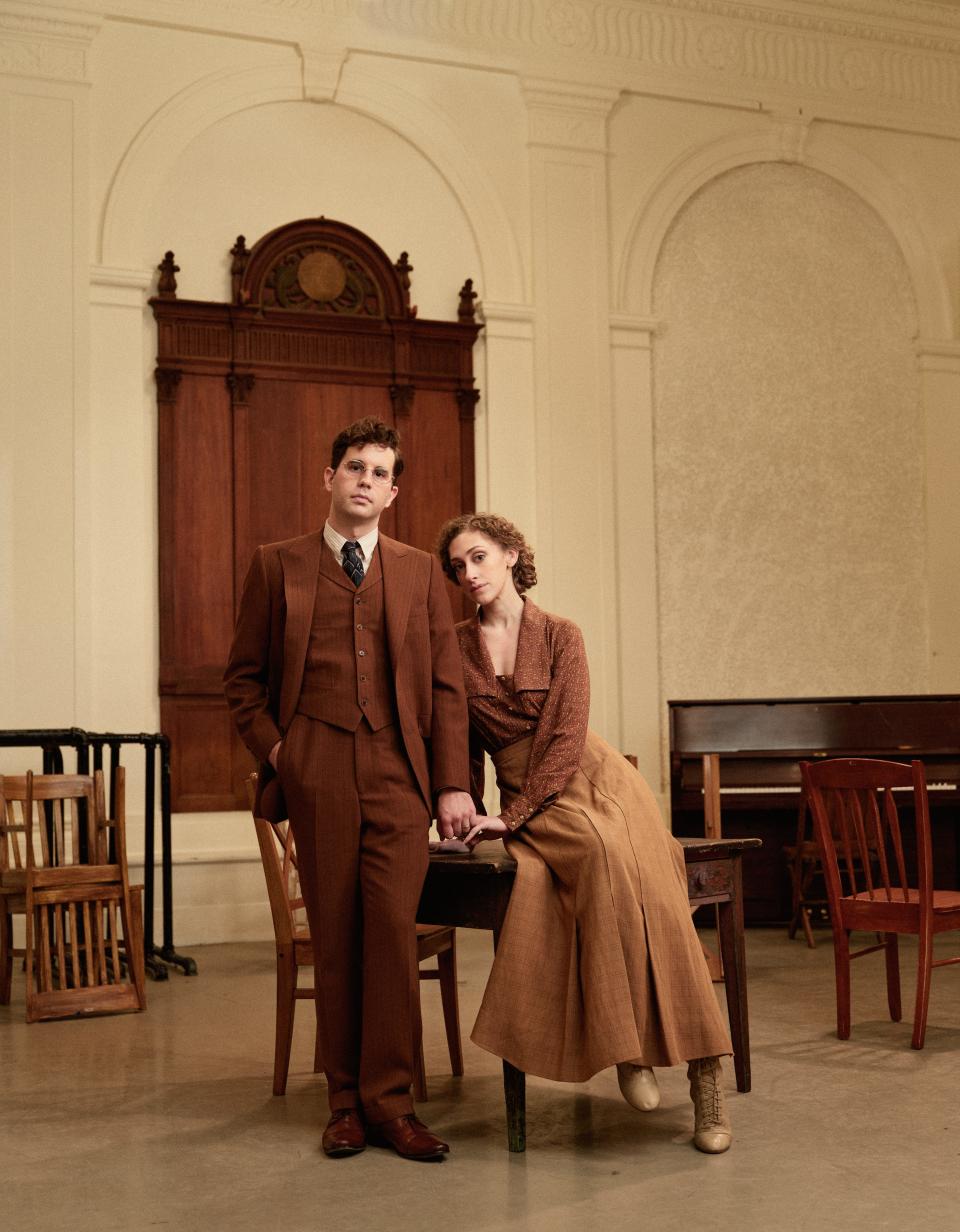Antisemitic protests at Broadway's 'Parade' called scary, disgusting — and not surprising
Life imitated art on Tuesday, in the ugliest possible way, when the Broadway musical "Parade," about a notorious antisemitic incident of 1915, provoked antisemitic demonstrations outside the theater where the show was having its first preview.
Theatergoers making their way into the Bernard B. Jacobs Theatre to see a show about Leo Frank, a Jewish factory manager in Georgia who was lynched for supposedly raping a 13-year-old girl, were greeted by neo-Nazis from the "National Socialist Movement" who shouted that Frank was "a Jewish pedophile."
"Learn the truth about what you're going to see tonight!" one of them shouted. "Romanticizing pedophiles — wow!"
"They were basically harassing everybody in line," said Katie Crawford, a Brooklyn theatergoer who was in the queue around 7:30 p.m. when she encountered the demonstrators. "There were officers and security kind of preventing them from getting onto the sidewalk. But somebody did get up there, and he was handing out flyers — some sort of antisemitic flyers with a link to some kind of website. I did not personally receive one of them."

There were a handful of demonstrators, between five and 10, she said — and they had stretched out a banner along the sidewalk saying the NSM "stands against Pedophilia."
Most of the people in line, Crawford added, chose not to engage with the demonstrators (the one handing out the flyers was wearing a ski mask).
"I felt pretty pissed that they had the audacity to do that," she said. "I thought it was disgusting behavior. I didn't feel scared, but it was a little jarring. I felt uneasy."
She felt more so at intermission — when she checked for information on her iPhone and discovered that the protesters were a neo-Nazi group. "When I came out of the theater, I was more nervous," she said. "And I felt nervous for the cast. I hoped those individuals were safe."
More:'We have your backs': Gov. Phil Murphy visits Bloomfield temple targeted in arson attack
The star of the show, Ben Platt, issued a statement on Instagram calling the demonstrators "disgusting."
"It was very ugly and scary, but a wonderful reminder of why we're telling this particular story," he said.
Indeed, the incident was a disturbing reminder of the continuing relevance of the show "Parade" — and, more broadly, a reminder of the state of the union in 2023.
"It's sad, but it's not surprising," said Rabbi Brian Beal, of Temple Beth Tikvah in Wayne. "Antisemitism and racism have been part of the human condition forever. What's different now is that people feel emboldened to act on that. We have Molotov cocktails thrown in a synagogue in Bloomfield. People like our former president and others are helping to unleash people to speak and act in a way that is scary and reprehensible."
The story behind the story
These days, many people have never heard of Leo Frank. But his story looms in the consciousness of many Jews, much as the 1963 Birmingham bombings are a horror of horrors to many African Americans.
As a student at Emory University in Atlanta — the city at the center of the episode — Beal found that the tragedy was seared into the collective memory of locals. Indeed, a 1937 movie dramatizing the case — it marked Lana Turner's breakout role, in form-fitting clothes, as Hollywood's "sweater girl" — was called "They Won't Forget."
"The community that's affected always knows more of the details," Beal said. "So I'll tell you that the Jews in Atlanta absolutely knew more about the Leo Frank case than even Jews in this part of the world. It's part of Southern lore — the history of Southern racism and antisemitism."
The writer of the 1998 musical "Parade," Alfred Uhry (he wrote the book; Jason Robert Brown wrote the score; both of them won Tonys), also had a personal connection to the case. His great-uncle owned Leo Frank's factory.

Frank, in 1913, had been accused of raping and murdering Mary Phagan, 13, one of his employees. Frank was sentenced to death after a trial that became a media circus and a lightning rod for antisemitism.
When the departing governor of Georgia, citing irregularities in the case, commuted his sentence in 1915 to life imprisonment, a lynching party abducted Frank from the jail in Milledgeville, Ga., and hanged him from an oak tree.
Among other things, the case led to the formation in 1913 of the Anti-Defamation League — as the protesters on Tuesday were quick to remind their captive audience.
"Wanna learn the truth about the ADL?" asked the guy handing out pamphlets.
More than 100 years later, some details about the case are still murky. But the evidence, overwhelmingly, points to Frank's innocence, according to most historians. In 1986, the state of Georgia granted him a sort-of pardon — not exactly exonerating him, but granting him a pardon on the grounds that the state failed to protect him.
The larger issue of the Frank case is the appalling racial hatred it unleashed. And that, alas, is still news.
That's why shows like "Parade" are important, said the Broadway League. On Wednesday, in response to the incident the previous night, it released a statement deploring "antisemitism and all forms of harassment."
"Now more than ever, the arts play a powerful role in creating community and bringing people together," the league said.
"Parade" will open Thursday, March 16.
This article originally appeared on NorthJersey.com: Broadway: Antisemitic demonstration proves relevance of 'Parade'

 money
money 